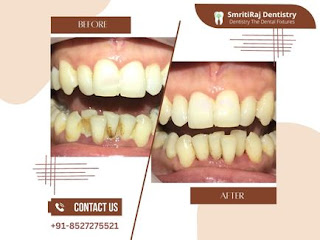Can Invisalign fix any orthodontic problem, or are there limitations?

Invisalign can fix a wide range of orthodontic problems , but there are some limitations. In general, Invisalign is effective in treating mild to moderate cases of common orthodontic issues such as: Crowded or spaced teeth Overbite, underbite, or crossbite Mild to moderate malocclusions However, there are some cases where traditional braces or other orthodontic treatments may be more effective or necessary, such as: Severe malocclusions Teeth that need to be rotated significantly Teeth that need to be moved vertically Large gaps between teeth Teeth that require significant movement or shifting Invisalign can be a great option for many people seeking orthodontic treatment, but it's important to consult with an orthodontist to determine the best treatment plan for your specific needs and goals.
.jpg)

